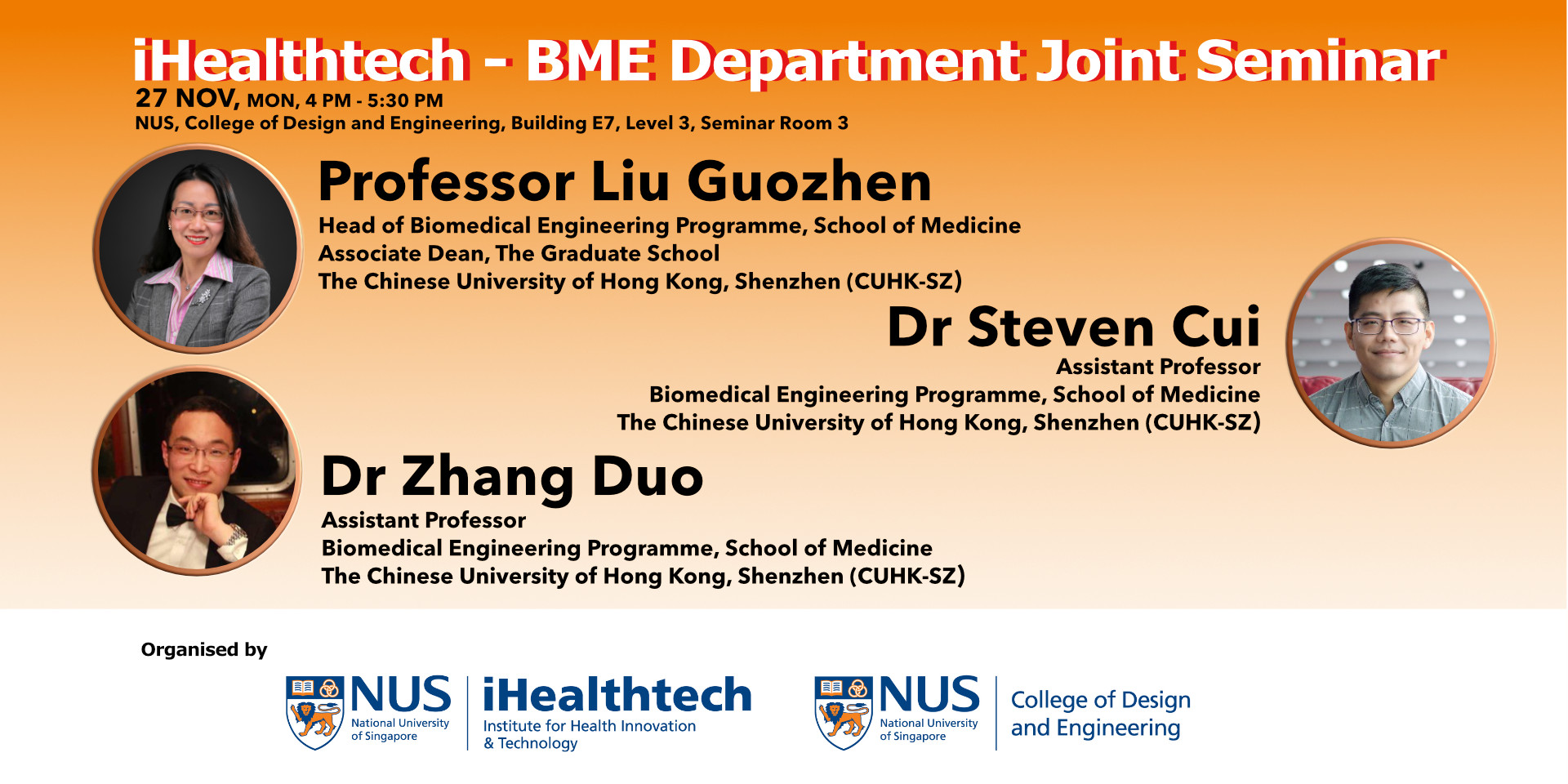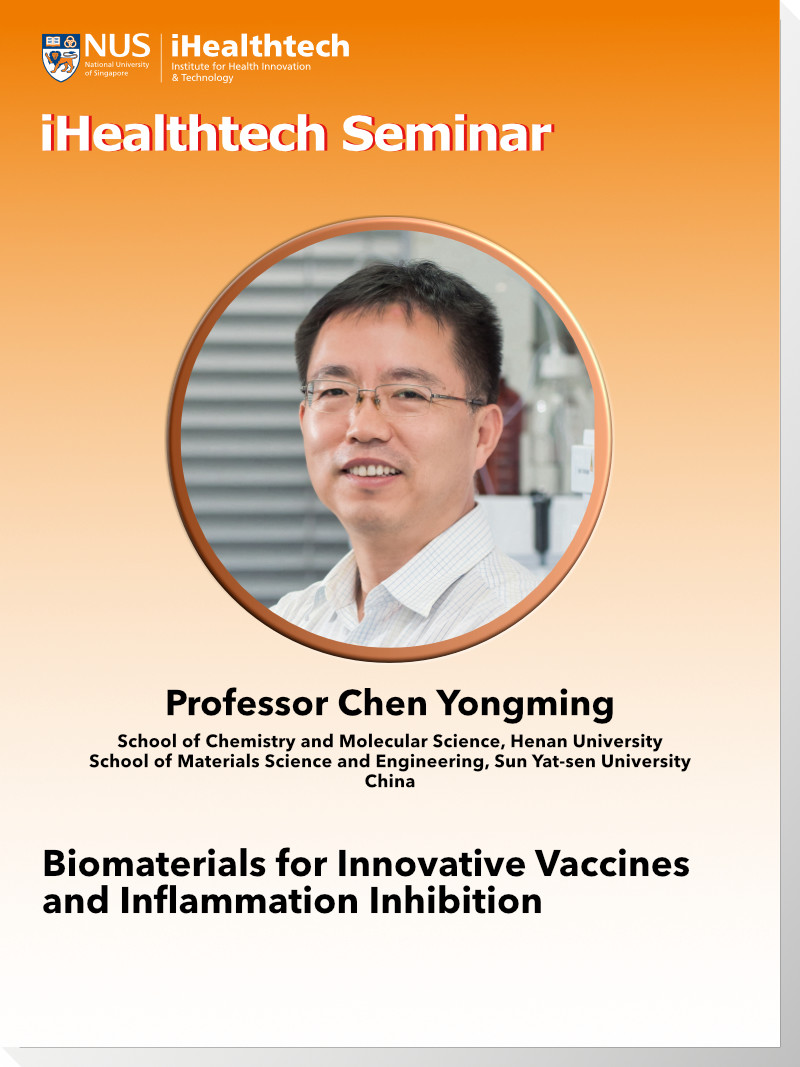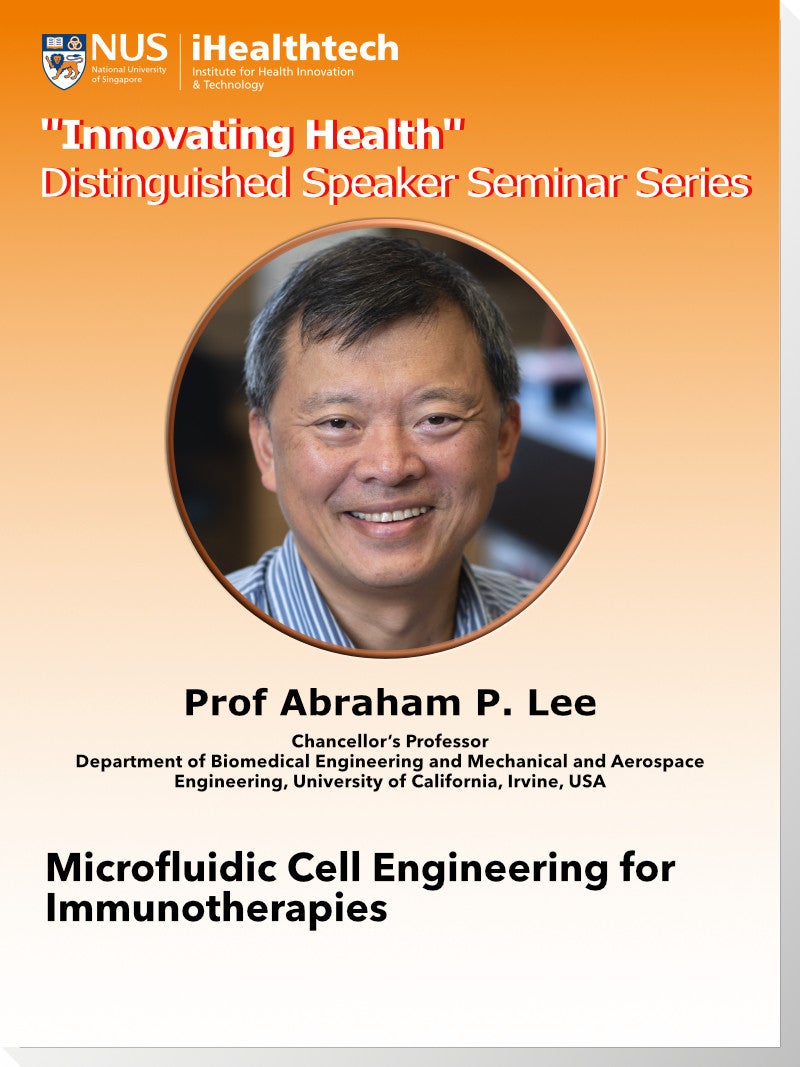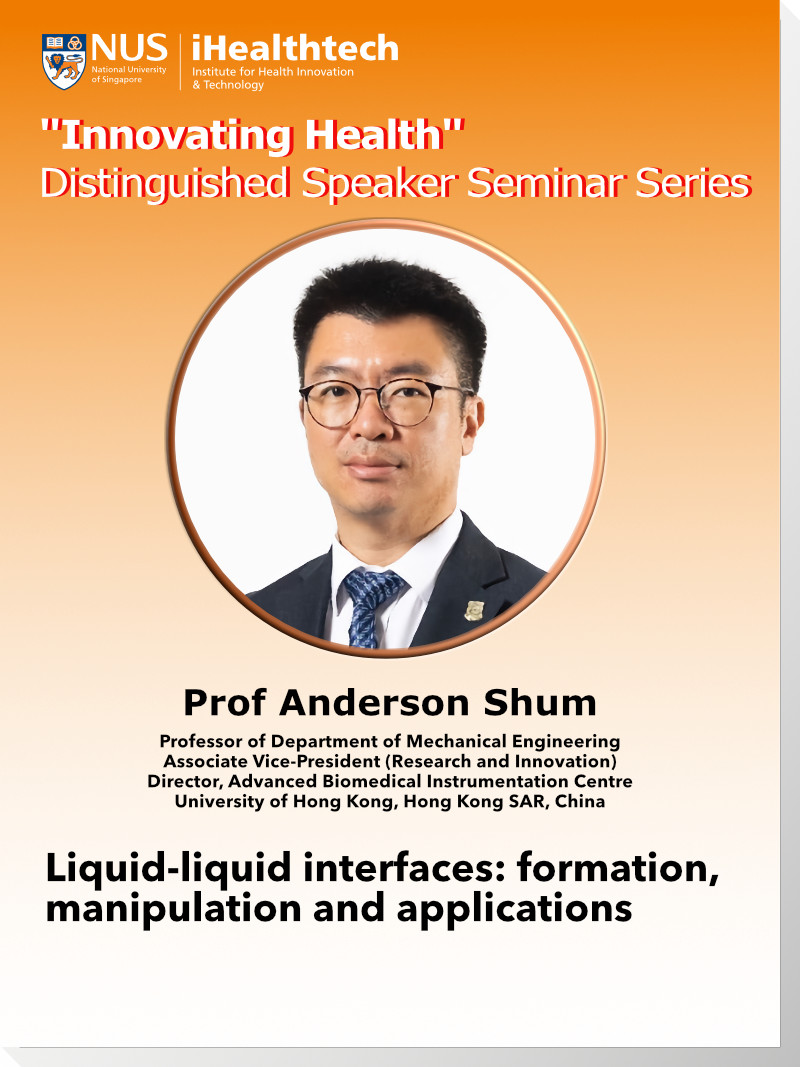iHealthtech – BME Department Joint Seminar
 |
Registration [Link] | Venue [How to get there] | Download the poster here [pdf]
Professor Liu Guozhen
Inflammation quantification from point-of-care to in vivo monitoring of cytokines
Inflammation’s link to cancer progression is well-established, driven by cytokines from innate immune cells. Unfortunately, tools for in vivo cytokine detection are lacking, hindering timely treatment. Advances in biosensors and nanobiotechnology enable responsive systems for noninvasive real-time monitoring. These innovations enhance precise treatment efficacy by integrating with medical devices for cell interaction. This talk will discuss recent research on cytokine detection systems, quantifying inflammation from point of care to in vivo monitoring in regions like the brain and spinal cord of mice, promising better diagnostics and therapies.
Biography
Guozhen Liu, a professor of Biomedical Engineering, is leading a research team working on Integrated Devices and Intelligent Diagnostics (ID2) with focuses on interdisciplinary and translational research to develop cutting-edge technologies applicable for point-of-care diagnostics, microfluidic biochips, intelligent nanoparticles, and medical devices to accurately diagnose, manage and prevent chronic diseases (such as diabetes, Parkinson’s disease). Prof Liu has published >160 peer-reviewed journal papers, 3 book chapters and lodged 19 patents. The patented technologies have attracted significant funding from Australian government and industries, such as AstraZeneca. She also received several funding provided by the National Natural Science Foundation of China. Prof Liu was awarded the prestigious Australian Research Council Future Fellowship (2016), the Academic Excellence Award for transdisciplinary research (2017), George Sweet Award for Women in Quantitative Biomedical Science (2020), and Presidential Exemplary Teaching Award (2023). She has been listed as the top 2% top global scientists, and as global scholars with international influence since 2022. Prof Liu’s research career has alternated between industrial and academic research. Prof Liu’s industrial experience includes over four years spent as R&D Manager, China for AgaMatrix Inc. to make medical devices for diabetes. She is the co-founder of Bio-Sens Tech Pty Ltd, a Startup company in Sydney. She has closely engaged with many international biotechnology companies, such as AstraZeneca, BioLegend, AgaMatrix, Regeneus, Boyalife. Currently, Prof Liu is serving as a Specialty Chief Editor of Frontiers in Bioengineering and Biotechnology, and a vice president of the NSW chapter of the IEEE Sensor Council.
Dr Steven Cui
Cellular and acellular strategies in cardiac and cartilage tissue repair
Joint and cardiovascular diseases like osteoarthritis (OA) and myocardial infarction (MI) are challenging due to limited regenerative capacity. Repairing or regenerating infarcted tissue is crucial for mitigating damage. Cell-based therapy is a primary approach, promoting differentiation or secreting signals for tissue repair. Cellular secretomes, including growth factors, extracellular vesicles (EVs), and decellularized extracellular matrix (dECM), are also being explored. Cell-free therapy offers advantages like reduced immune rejection and ethical simplicity. This talk will highlight our group’s developments in both cell and cell-free therapies, along with biomaterials and 3D biofabrication techniques for cartilage and cardiac tissue repair.
Biography
Dr Xiaolin (Steven) Cui, a professional biochemical engineer, joined the University of Otago as a postdoctoral Fellow after completing his PhD from the University of Adelaide in 2017. He was later promoted to Research Fellow in 2019. In 2021, he was appointed as an adjunct associate professor at the Department of Bone and Joint, The First Affiliated Hospital of Dalian Medical University. In July 2022, he joined the School of Medicine as an Assistant Professor at CUHKSZ. Dr Cui specializes in the interface of stem cells, biomaterials, biofabrication, and tissue engineering. He has a special interest in cartilage and bone regeneration, as well as cardiovascular disease diagnosis and treatment. His expertise includes polymer synthesis, tissue culture, anticancer drug screening, drug and gene delivery systems, and stem cell therapy. Currently, he is leading several pre-clinical trials in the field of tissue engineering. Dr Cui has received the 2021 WFIRM Young Investigator Award from the International Society for Biofabrication. Additionally, he has received a provisional PhD scholarship from the University of Adelaide, University of Otago Divisional Health Science Postdoctoral Fellowship, National Heart Foundation of New Zealand Research Fellowship, New Zealand Ministry for Business, Innovation and Employment (MBIE) Science Whitinga fellowship, and New Zealand Foundational Advice Emerging Researcher Award.
Dr Zhang Duo
Manufacturing biomimetic tissue models and functional soft devices with biofabrication techniques
Biofabrication, an interdisciplinary field at the nexus of engineering, biotechnology, and medicine, finds diverse applications in biomimetic devices, regenerative medicine models, diagnostic equipment, and organ-on-a-chips. This seminar offers insights into the latest advances in biofabrication, focusing on in vitro fibril tissue models, micro-fiber characterisation, hydrogel printing, and strategies for creating flexible biomimetic structures. The discussion also includes upcoming research on drug experimental tissue models, implantable bioreactors, and flexible soft robotics.
Biography
Dr Duo Zhang graduated from the University of Hong Kong with a Bachelor’s degree in Electronic and Communication Engineering, and successively pursued his doctorate studies at University of Oxford and University of Cambridge. He obtained his PhD in Biomedical Engineering from University of Cambridge, and remained in Cambridge for a further postdoctoral research experience. Dr Zhang demonstrated the ability to lead and assist in diverse and multi-disciplinary scientific research projects via contributions to academic collaborations, as well as high-impact publications in Bioactive Materials, Advanced Materials Technologies, Biofabrication, Chemistry of Materials, ACS Applied Materials and Interfaces, Scientific Reports, MRS bulletin, etc. He has also participated in several granted projects from the European Research Council (ERC) and the Engineering and Natural Sciences Research Council (EPSRC). He is a member of the Engineering Society of International Organizations (TERMIS), and have also presented academic talks at several international conferences (TERMIS EU 2019, BDMC 2018) and Cambridge university-wide seminars. With a keen acumen for scientific advancement, Dr Zhang has achieved a series of innovations in additive manufacturing tissue/organ scaffolds, in vitro tumor model studies, and theoretical models predicting fibre surface microstructures.






